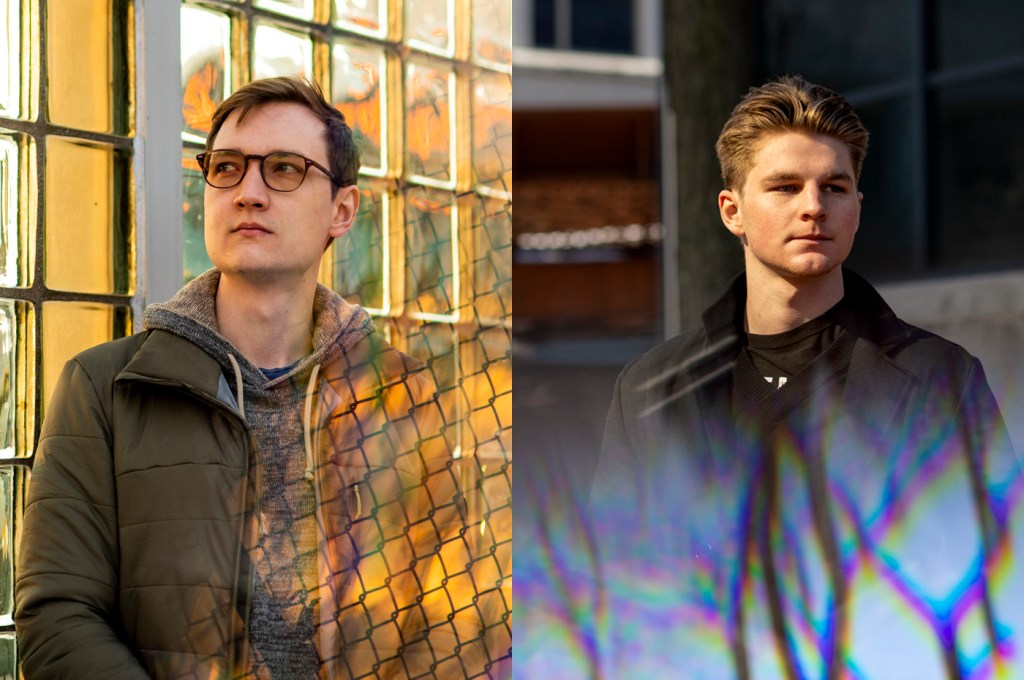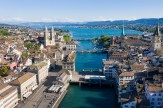Russian students at Northeastern express support for Ukraine, share feelings about the war

This report is part of ongoing coverage of the Russia-Ukraine war. Visit our dedicated page for more on this topic.
Dimitri Trotiskii, a graduate student at Northeastern, had just moved from Russia to Northeastern’s Boston campus when Russian forces began bombing Ukraine Feb. 23.
“I was shocked,” says Trotiskii, who does not support Russian President Vladimir Putin’s war in Ukraine, which is entering its second month.
Prior to the invasion, Trotiskii had been keeping a close eye on the Russian military massing at the Ukrainian border, and was well aware of reports suggesting the Russian leader was going to attack.
“I just never thought it would actually happen,” says Trotiskii, who came to the Boston campus in January as part of Northeastern’s Align master’s degree program. He says he’s deeply conflicted about completing his degree as his country continues “these atrocities” in Ukraine.
As of Thursday, March 24, the civilian death toll in Ukraine has surpassed 1,000, with several thousand more military casualties, according to multiple sources. Between 7,000 and 15,000 Russian soldiers are believed to have died as well, according to U.S. and NATO estimates.
“Being from a country that’s literally committing these atrocities, it’s just hard. I know that many friends and family members [in Russia] are very depressed about this. It’s really hard just to feel like you’re a part of it,” says Trotiskii, referring to the unprovoked invasion of Ukraine.
The graduate student is one of two Northeastern students with strong ties to Russia who reached out to News@Northeastern to speak out against Russia waging war on Ukraine.
Amid an ongoing crackdown on anti-war protests and the possibility of government retaliation in Russia, a number of Russian students News@Northeastern contacted did not want to be interviewed, fearing what the consequences of doing so might mean for them or their families back home. Others spoke on the condition of anonymity for similar reasons.
Northeastern has offered support to its students with ties to the conflict in numerous ways, from suspending financial holds and reducing account barriers, to one-on-one sit-downs with university staff, says Keyne Cahoon, director of student support services at Northeastern.
“One of the more important messages that we want to continue to promote is that our actions go beyond just sending out emails,” Cahoon says. “We want students to come to us so that we can sit down with them to help in as many ways as possible.”
Several days after the invasion began, Cahoon said her office met with a half dozen Russian students—both virtually and in-person. Some were concerned about the possibility of being expelled from Northeastern—anxiety that stemmed from a Russian disinformation campaign targeting European universities that administrators there and international groups have since dispelled.
Cahoon and her colleagues quickly worked to reassure them that that would not happen at Northeastern. There are currently 112 Russian students and 37 Ukrainian students at Northeastern enrolled on academic visas.
Unlike Trotiskii, Nikita Clark spent very little time in Russia before attending Northeastern. The first-year computer science major says he’s outraged by the attack, even though both of Clark’s parents grew up in the former Soviet Union and some of his relatives are Putin supporters.
“Russia is an aggressor, and there are a lot of terrible things happening right now. Innocent people are dying, civilians. This war is not supposed to happen,” says Clark, who was born in Seattle. He lived in Thailand and Russia with his parents and siblings before moving to Boston a few years ago.
“I don’t know what they’re fighting for,” Clark says of the Russian forces. “I don’t think they even know what they’re fighting for.”
Clark and Trotiskii aren’t alone—thousands of fellow Russian citizens swarmed the streets of Moscow in protest just one day after the incursion, and more than 4,500 protesters have been arrested as of March 10, according to OVD-info, a human-rights-focused media organization. Other college students from Russia have stood in support of Ukrainian students and civilians in Boston.
Neither Trotiskii nor Clark believes Putin’s argument that Russian troops invaded to free Ukrainians from neo-Nazis who are committing genocide in Ukraine—a bogus claim Putin used as a pretext to invade the country. Many Russian citizens, including some of their relatives, support the war and are unaware of the civilian death count because the Putin-controlled media has been reporting misinformation, Clark says.
“They’re just filled with disinformation. I think even Putin himself is kind of lost, that he doesn’t know what to do because he was expecting the war to end in days, and Kyiv to be captured in just a matter of days,” Clark says.
Both students say they’ve also faced scrutiny about their allegiances since the war started, discussions Trotiskii says are uncomfortable but understandable as the conflict dominates the headlines.
“Many people are curious about my position on Putin,” he says. “I disagree with all of Putin’s policies. I disagree with the conservative, kleptocratic government he installed in Russia and the way they lead the country.”
Despite Russian attempts to incorporate democracy in the late 1990s, the quality of life in the country has remained grave, Trotiskii says.
“Russia has been constantly isolated,” Trotiskii says. “People who live there are deprived of even basic freedoms. Even if the country wasn’t so corrupted, my values don’t align with the conservative politics there. So pretty much on every level, I don’t support the Russian government.
Trotiskii adds that he respects the growing democratic sentiment that’s taken root in Ukraine, and the displays of fierce pride and defiance of the Ukrainians since the invasion.
Clark, who has been living in Boston for the past few years, said it has been difficult to navigate relationships with some of his relatives who support Putin.
“The most frustrating thing for me, the thing that drives me crazy are the [Putin-controlled] YouTube channels and social media channels,” Clark says. “They’re saying that people are not getting killed in Ukraine and all these other lies.”
Both Clark and Trotiskii, who will continue their studies here at Northeastern, are unsure how the war will end. They say they’ll continue to show support for Ukraine while doing what they can to support their loved ones in Russia.
Trotiskii hopes he can financially bolster his family as the value of the Russian ruble continues to tumble as a result of hefty sanctions imposed by Western nations on Russia following the invasion.
“Maybe I can offer them some kind of hope in terms of the future,” Trotiskii says.
Clark continues to talk to his father, who is presently in Russia but opposes the invasion.
“My father and I agree on things, and it kind of makes me feel good because he is an important role model in my life,” Clark says.
And he says he is actively working to push back against misinformation when he sees it.
“I’m going to keep sharing actual information about what’s happening in Ukraine,” Clark says. “And I’m going to continue talking to any friends who don’t understand what’s really happening. The more people who break through this barrier of misinformation and actually see the truth, hopefully more of them will come out on the streets of Russia and protest the war.”
For media inquiries, please contact media@northeastern.edu.






